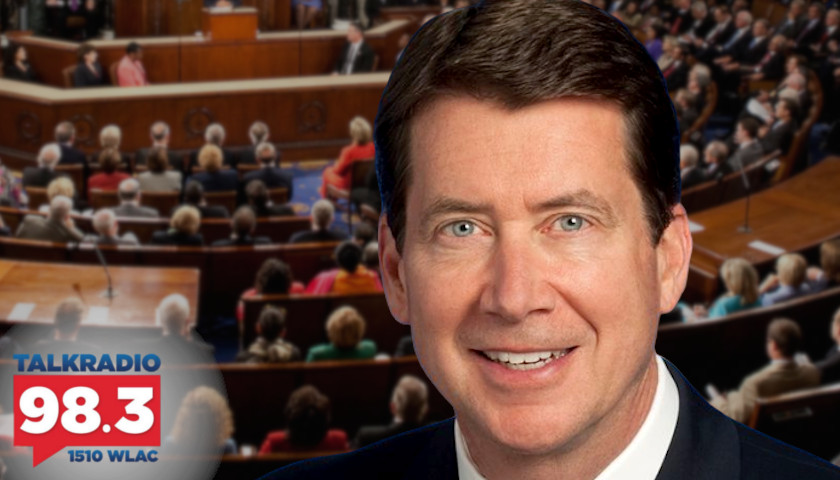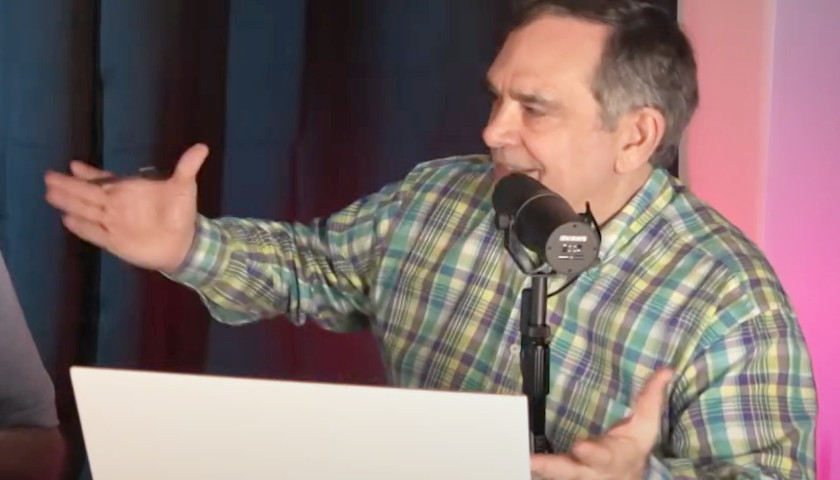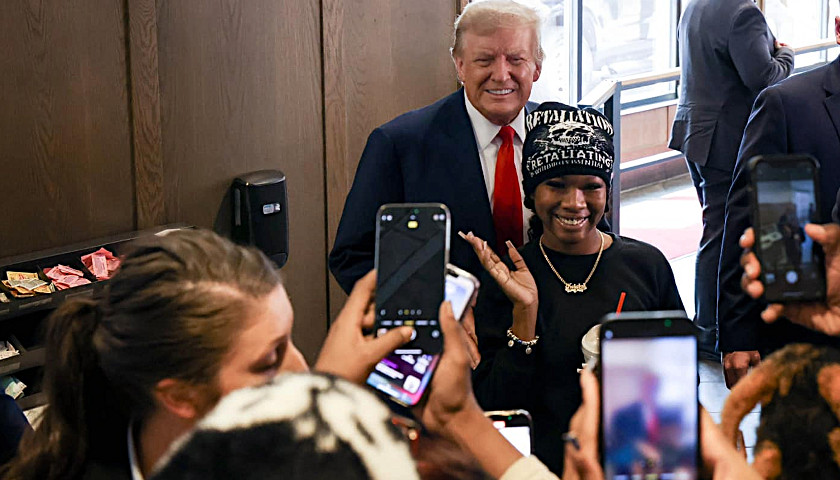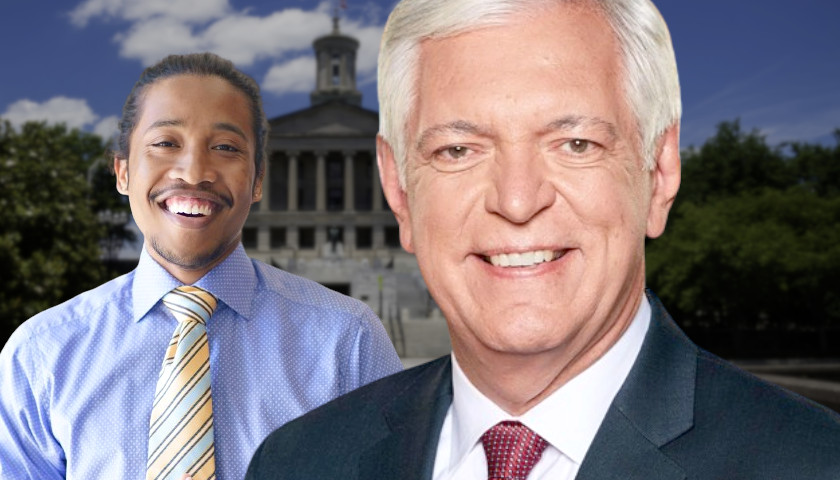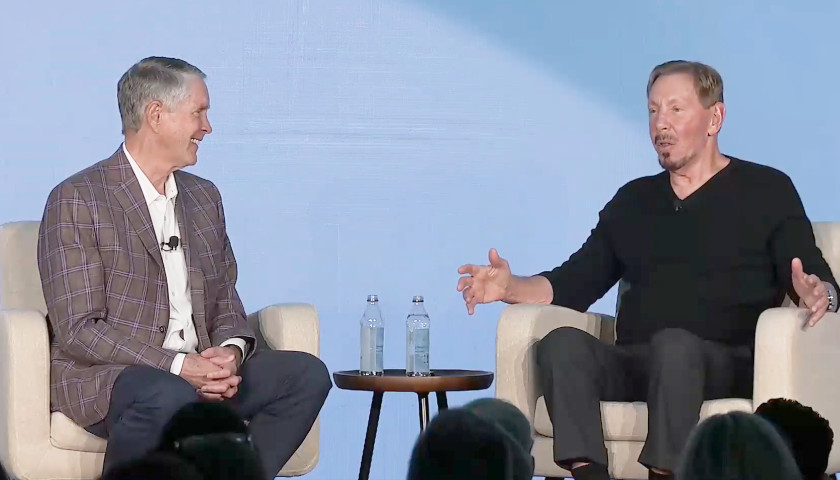Live from Music Row Tuesday morning on The Tennessee Star Report with Michael Patrick Leahy – broadcast on Nashville’s Talk Radio 98.3 and 1510 WLAC weekdays from 5:00 a.m. to 8:00 a.m. – host Leahy welcomed public affairs strategist Clint Brewer in the studio.
During the third hour, Brewer weighed in on the recent Republican and Democratic U.S. Senate primary results noting that Bill Hagerty held an aggressive campaign in the rural areas while Sethi’s campaign may have underestimated them. He added that the Democratic primary upset of James Mackler by victor Markita Bradshaw could be attributed to her geographic location in Shelby County and riding the current wave of left-wing ideologies.
Leahy: We are joined in the studio by our good friend, all-star panelist, and former journalist.
Brewer: Recovering journalist.
Leahy: Recovering journalist and public affairs strategist Clint Brewer. Good morning Clint.
Brewer: Hey good morning Mike. How are you?
Leahy: We’ve got to go with that phrase recovering.
Brewer: Recovering. Yes. Yes.
Leahy: Recovering journalist. Well, the big story last week was the Republican primary of the U.S. Senate. Your former boss Bill Hagerty. Won resoundingly.
Brewer: He did.
Leahy: It was a 12 point victory over Manny Sethi. Manny ran a very energic campaign and was a very personable guy. A lot of people liked Manny, the Vanderbilt emergency room surgeon. Bu tin the end, Bill Hagerty kind of stomped by 51-39.
Brewer: He did. And in an interesting fashion. The counties that went with Dr. Sethi were the large ones. It was Knox and Davidson and Hamilton.
Leahy: Hamilton.
Brewer: And then the larger suburban counties around Nashville. Rutherford, Williamson. Normally backbones of any Republican Party victory. The swath of Hagerty brand red through rural Tennessee was staggering in a good way. I think the best man won.
Leahy: But you’re biased because you worked with Bill Hagerty.
Brewer: I’m’ not even going to act like I’m not biased.
Leahy: You worked for him for four years. But he is empirical, we can say this, my feelings aside, he is one of the most qualified people we’ve ever elected to public office in the state. He is exactly what the U.S. Senate needs. And it was nice to see his time helping to recruit companies to Tennessee. There was obviously some resonance in Tennesse with the quality job he did for rural Tennessee. The race kind of flew under the radar screen nationally until the end.
Leahy: In the end, it was the bitterness of the tax back and forth over campaign contributions and other things.
Brewer: It was but I think the story that is missed here is the Trump campaign is touting the sort of unheard and uncounted majority that’s out there. And don’t believe the polls. Well you know, there were a lot of people leaking polls and putting polls out in the final days that made that Hagerty Sethi race look a lot closer than it was. And it wasn’t.
Leahy: Let’s talk about poling as a narrative. This is the whole theme when I write at Breitbart. Poling as a narrative in 2016. It’s still polling as a narrative at a national level in 2020. There was a poll released by a group affiliated with the Sethi campaign which was the only public poll that showed with a couple of weeks to go showing Hagerty up three. Then you heard rumors. Rumors largely from folks in the Sethi campaign saying that we’ve got a poll showing Sethi up by six points. I had several people tell me that.
Brewer: Yes. I heard that as well. That’s my point. If you look at Ambassador Hagerty’s victory, it was in gigantic chunks of rural counties. And so obviously there was entitlement out there and a vote out there that these polls weren’t capturing.
If I’m a national pundit looking at the presidential race and granted, Tennessee is a pretty red state, I’d extrapolate that out. If that’s happening in Tennessee to the president’s guy then what does that mean for the president nationally? I think our poling apparatus whether it’s mainstream media a university. I think it’s broken.
Leahy: If you look at the 95 counties in Tennessee Bill Hagerty won 83 of those counties. And you went down through the list. It was very surprising to me that the 12 counties that Manny Sethi won were really our listening audience in 2 to 5 points in Davidson County. Williamson County. Rutherford County. Murray County. Wilson County. That’s our listening audience.
And Manny Sethi won by two to five points in each of those counties. He also won Knox County, Knoxville. Hamilton County, Chattanooga. The rural counties he won Camden and Coffee County which is where he grew up in the area of Manchester.
And then he won Franklin and Moore. And that’s it. Every other rural county by a large margin Bill Hagerty won. What do you attribute that too? Was it more advertising in a COVID-19 era? Was the support from the president that came for Bill Hagerty? What was that sort of rural victory about?
(Commercial break)
Leahy: I just love saying broadcasting live from our studios.
Brewer: Doing anything live is nice.
Leahy: On Music Row.
Brewer: Doing anything live is good.
Leahy: In-person.
Brewer: That’s right.
Leahy: We are socially distanced.
Brewer: We are an appropriate distance apart.
Leahy: Six feet apart.
Brewer: There are not many people in the building.
Leahy: Nope, nope, nope. We are isolated.
Brewer: There is hand sanitizer at every turn outside the studio. (Leahy laughs) We are doing everything correctly.
Leahy: Doing everything correctly. I don’t know. We want to keep Sharon Hurt out of the building because I’m sure she’d want to find a crime that’s been committed here. (Laughs) Anyways, we were talking a little bit and I was trying to ask you to explain to me this phenomenon in Thursday’s primary election where Bill Hagerty just stomped his opponent Manny Sethi. A good guy by the way. But stomped him in rural Tennessee.
He won 83 of 95 counties. And you look at the county and in some counties, he won 70-30. Others 65-35 and 60-40. Why did Hagerty do so well in rural areas? Because when you talk to the insiders they said, well you know the question is going to be will Sethi have enough of a margin of victory in the rural counties to overcome Hagerty’s advantage in the urban areas? Didn’t turn out to be that way at all.
Brewer: No it did not. I think its a combination of things. First and for most, you can’t discount the president’s appeal in rural Tennessee or rural America period. His America First message resonates with people in rural areas.
I think the campaign just relentlessly drove home the fact that and in a meaningful way that the president had endorsed Ambassador Hagerty. I just think that was their overriding message that they just never strayed from in rural Tennessee.
Obviously they knew it would work. That’s the first thing. It’s not just the endorsement but its the use of endorsement in rural Tennessee and understanding that that would connect out there. That’s was the first thing. The second thing and I just have to say it because I saw it was the work rate. I mean they were in rural Tennessee constantly. Bill Hagerty with his wife, with his family, the campaign. They were out.
Leahy: Campaign appearances.
Brewer: In rural Tennessee in a relentless fashion. They just went after that vote. From my observation point far more than the Sethi people did. I think that’s the first two things. In terms of digital, I have no idea how that works targeting rural Tennessee.
It can be difficult with a lack of broadband and the type of devices that are used out there. I know that can be challenging. They just did a better job of getting out there and they had a huge advantage in that they understood the president’s appeal there. And I think that was underestimated by the Sethi campaign.
Leahy: Now, let’s look at the Democratic campaign.
Brewer: Fascinating.
Leahy: What happened there?
Brewer: Well you know, those things have happened before.
Leahy: And by the way, just to describe. The guy who was supposedly going to be the guy to take the Democratic nomination. Which is, by the way, you’re going to lose Democratic nominee. You are not going to win.
The best shot the Democrats had was Phil Bredesen who lost to Marsha Blackburn despite spending millions and millions and millions of dollars. So this guy who fits the profile of Democratic challengers, James Mackler. An attorney in Nashville and an Army veteran. I think he raised a couple of hundred thousand bucks maybe more. He ran against Marquita Bradshaw?
Brewer: I believe so yes.
Leahy: Marquita Bradshaw is sort of Tennessee’s version of Alexandria Ocasio-Cortez. Sort of. She spent $8,000 on her campaign in the first quarter according to the FEC filings. She calls herself an environmental activist. A Black activist. A social justice warrior. And she’s all for the entire Green New Deal. Redistribution of income. Socialism. She won the primary.
Brewer: Yeah I mean it’s happened before. The late John J. Hooker came out with a few statewide nominations as I recall from the Democratic Party besting several people who were the ordained likely nominee. It kind of makes sense to me. I didn’t see Mr. Mackler getting a heck of a lot of traction.
And I would just say from a voting standpoint I would think that Shelby County and I haven’t looked at how she won, but I would imagine Shelby County would be much more organized and motivated in a Democratic primary then Nashville is.
Leahy: There was a geographic element to that campaign. There were four or five candidates and she was the only one from Shelby County. She’s a known social justice warrior for some time from Shelby County. So she does have a geographic base.
And when you look at the numbers she did very well in Shelby County. And the others were from Middle Tennessee or East Tennessee and split the vote. So that’s why in part she squeaked through with a 35-30. If you are Mackler, I mean, that’s a pathetic campaign. (Chuckles)
Brewer: Saying he raised a couple $100,000, that’s like sending somebody to Ruth Chris with a five. (Leahy laughs) I don’t want to belittle him.
Leahy: Insufficient.
Brewer: That’s not going to get you very far in a statewide race. She just had the advantage of geography. I think for her it was the issues. I think the timing was spectacular. She obviously rode a current wave of thought on the left side on certain issues.
Leahy: Yes. Which is we hate America and tear it all down. Which is not going to play well in the general election.
Brewer: The things you’ve talked about, social justice, the environment sort of tuned into that AOC message. It tuned into the current protests. That’s going to play in Democratic Party circles in Shelby County and she took advantage of it. And good for her, she will be able to say she was the Democratic nominee for the U.S. Senate. Maybe the Democratic Party needs a few of those kinds of nominees.
Leahy: I hope they nominate as many of those social justice warriors as possible.
Brewer: I’m not so much talking about the issues. When you have a candidate that’s pre-ordained and there is no really obvious reason for it. The Democratic Party does that a lot here. Ever since the Republican sweep in ’94 and then Gore’s loss in 2000, the Democratic Party has put up the sort of nominal candidates just to have somebody in the race. And it’s not often very well thought out. There is not a lot of intention applied or support given to these folks who step in there.
Leahy: I suppose Marquita Bradshaw will be able to raise some money from Act Blue, right?
Brewer: It just depends. I’m a big fan as a former journalist, one thing I always watch with campaigns particularly statewide or national campaigns is who are the advisors. Who are the operatives working for the candidates? Because that’s as much as a story as the candidates themselves. The question will be is who will she have helping her?
Is it a homegrown grassroots kind of thing out of Memphis with a few people who run local campaigns in Memphis? Is some national organization going to sweep in and help her? Is some more experienced and the headcount of those in Tennessee is getting less and less, experienced Democratic Party or Democratic campaign operative going to help? That to me is the insider question that matters.
Listen to the full third hour here:
– – –
Tune in weekdays from 5:00 – 8:00 a.m. to the Tennessee Star Report with Michael Patrick Leahy on Talk Radio 98.3 FM WLAC 1510. Listen online at iHeart Radio.

